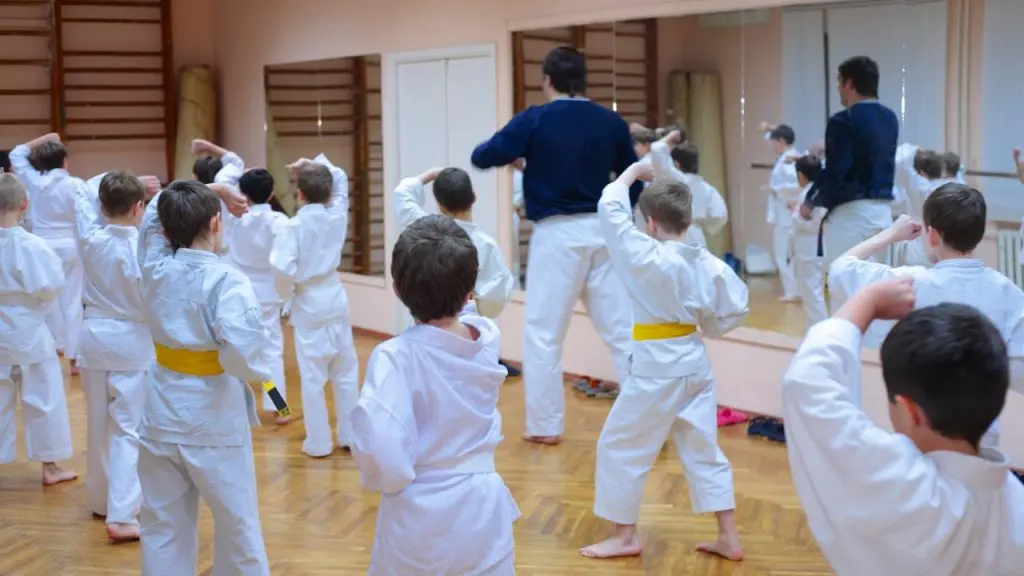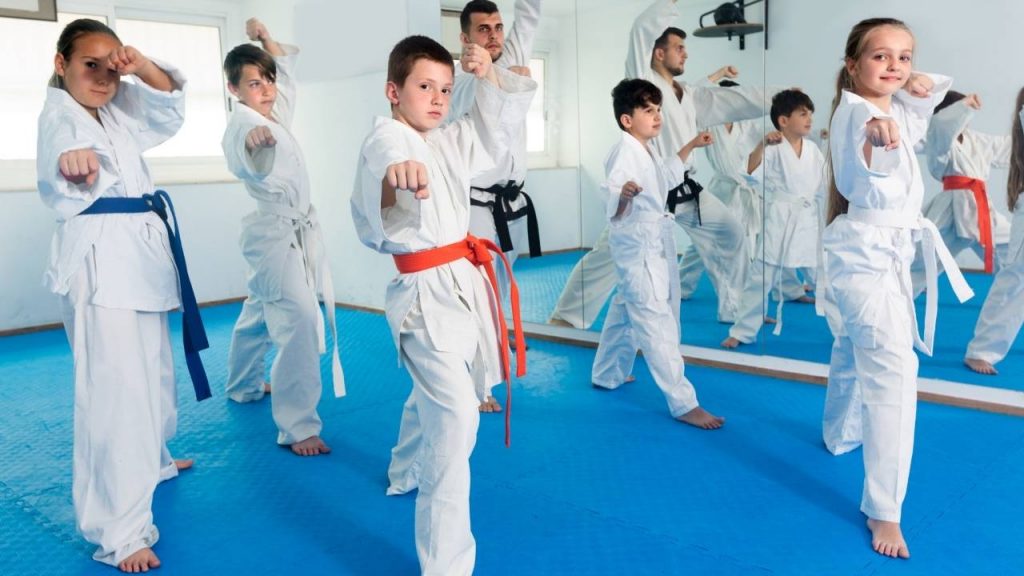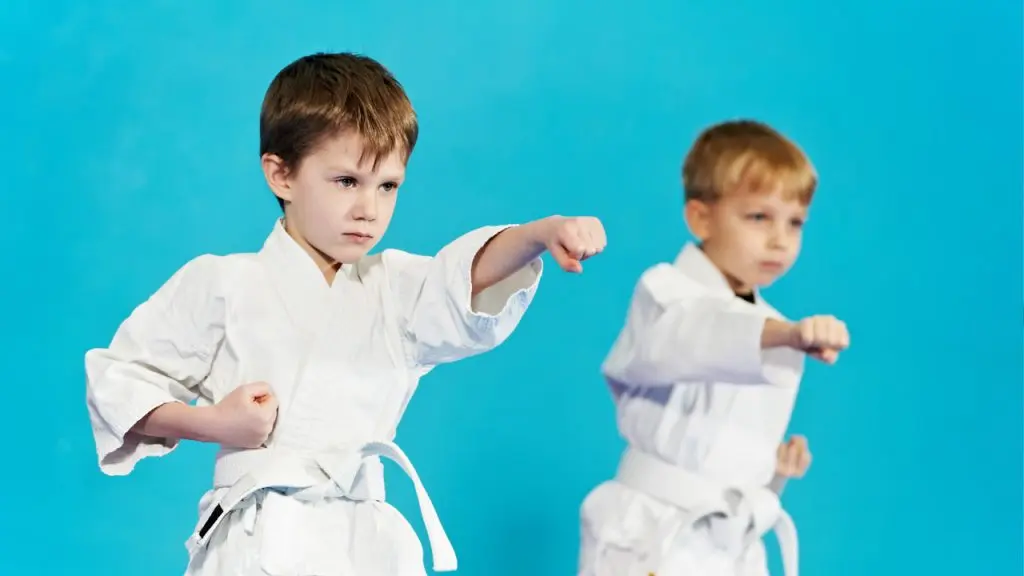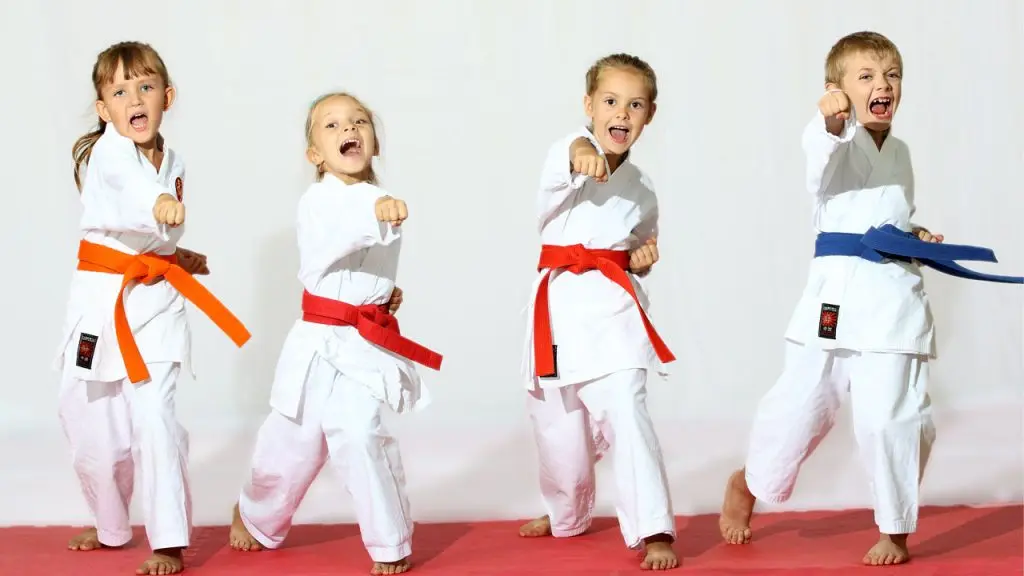Karate training can be a stellar way to develop the body and the mind, learn striking and self-defense, and benefit from a host of physical and fitness benefits. While people of all ages can learn karate from the right program and the right sensei, there is certainly a consensus that starting young can positively impact the efficacy of karate training and the skill level a practitioner can reach with age.
After all, most of the masters of the art started at a very young age: there must be some merit to an early start.
So, at what age can kids start karate? If you are a parent looking to enroll your child in a karate school or dojo, figuring out the best age to start karate can be crucial. We will discuss the factors that impact learning, how age can affect training and its results, and how starting young in karate can positively affect children’s lives.

Table of Contents
The “Right Age” Debate
Some people engage in debates about the “right age” to begin karate training, or when any other kind of martial arts training might be. On the one hand, like many different activities that involve skill, muscle memory, and mental and physical agility, starting early in karate can have significant benefits as the body and mind both learn to adapt to the core techniques and movements of the art.
The body and mind can literally be molded into a particular shape, emphasizing certain core qualities, with an early start in karate.
On the other hand, the benefits of learning karate for people of all ages have also been well-documented. Young adults, people in the middle age, and even seniors derive excellent benefits from learning karate. While these are usually age-appropriate and do not often translate to world-class skills fit for competitive events, they remain essential benefits that can transform lives.
To figure out the best age to start karate for your child, you would need to take a look at a few crucial details:
- Research indicating the benefits of early karate training
- Personal stories and anecdotal evidence regarding the positive effects of early karate training
- Early training opportunities offered by the top karate schools in the country
- Expert opinion, usually coming from skilled practitioners in the arts and experienced teacher
With these points in mind, let us examine research efforts indicating that an early start in karate can be beneficial.
Effect on Personal Traits and Values
According to a US National Library of Medicine study trying to look into the psycho-sociological impact of martial arts training on young people, a range of research attempts on the topic over the years have yielded many positive findings.
According to several research efforts, karate training at a young age has had an observable positive effect on self-confidence, self-esteem, general self-development, self-reliance, the autonomy of action, and self-acceptance, and personal growth. Obviously, something the parents of Gordon in Dodgeball should have enrolled him in!
Similarly, many such studies also positively affect cognitive functions and traits like humility and civility. Karate training has also displayed positive changes in young people suffering from anxiety, stress, and energy release issues.
According to the study, long-term martial arts training has often correlated with a lower level of anger and aggression in children. As a parent, these can indeed be important factors to consider while choosing a suitable age for your child to begin learning karate.
Wellbeing and Social Behavior
A study from the European Journal of Human Movement has shown a definite connection between the learning and practice of martial arts and stress relief. This research focuses on mindfulness as a crucial criterion for wellbeing.
It shows that mindful energy expenditure with high concentration levels, as achieved in karate training, can help people manage stress and improve their quality of life.
Another topic of research in child psychology has been the positive impact of martial arts-based programs in elementary schools to combat bullying.
According to this study, these programs influenced children to tone down their aggression, participate in helpful activities, and develop a more profound sense of empathy.
With these factors in mind, let us look at how karate training can help children of different ages.
Karate Training for Kids
Several professional karate schools and reputed teachers provide karate classes for children as young as three years of age. Reputable karate schools around the country have special programs for young and very young children.
These programs are usually age-appropriate and serve as rudimentary training to help with more focused and rigorous training later in life. This training can also serve as a meaningful and constructive outlet for energy and aggression and a fun activity that young children can regularly enjoy.
Starting training early, as early as three or four years of age, can help establish correct technique and form and create the neural pathways for essential muscle memory activities that can serve karate practitioners well later in life.
On the other hand, many masters believe that there is a “sweet spot” for the right age for learning karate. The discipline of karate has effective striking at its core. Children usually develop the necessary muscle strength and coordination to start learning and practicing this safely only after a certain age. For this reason, many schools do not open their program to children under the age of six or seven.
At the age of six or seven, children already have the requisite muscle control and strength to throw punches and kicks, turn and move, balance themselves on one leg, and carry out basic jumps. They are also more equipped to cooperate with their peer group and display leadership and teamwork skills.

Best Age to Start Karate: The Right Age for the Right Purpose
With all this information, it is safe to say that the right age for karate training for kids would depend on many factors. You would have to look at the proficiency level you are targeting for your child, the current state of physical and mental development, the quality and direction of the karate teachers and classes in the area, and the training methods.
Here is a short breakdown of the ideal ages to start karate training for your child for specific focus areas.
1. Ages Three to Five
In this age group, training is usually safe, simple, and fun. Teachers usually focus on fun exercise routines and activities while throwing in some basic technique and form practice. This is not something Master Li would do though as depicted in the recent Karate Kid movie – don’t send your kid to his class!
Moreover, training at this age can be a fun way for children to let out pent-up energy and remain engaged while learning to work closely with a peer group and learn the karate discipline’s very basics.
Starting karate lessons at this age can also help a child learn the basic rules of the dojo and exemplary conduct towards the sensei and fellow learners.
Children can learn the value of respect and develop more confidence in themselves and their abilities as they move over to more complex and challenging training in the future. For children with discipline and anger issues or hyperactive kids, starting to learn karate at this age can be beneficial.
2. Ages Six to Ten
At this age, the most critical part of the training begins for many karate students. For those with competitive aspirations, this age group is often the ideal to start training. Classes typically include concrete foundational concepts, form, and technical lessons of karate and a beginners’ insight into the deeper, philosophical aspects of it.
For those aspiring for one or more black belts in the future, this can be an outstanding time to start learning. A lot of skilled karate practitioners and competitors had their beginnings at this age. If you want your child to start training and get immersed straight away into the technical aspects of karate and serious practice, this is an excellent place to start. Another important consideration is whether the best karate schools in your area encourage learning before this age level.
3. Age Eleven to Young Adult
According to your child’s level of physical and mental maturity and skill, starting to train at this age can yield productive results. Many successful practitioners of karate began training later in life with no perceptible loss of skill or insight. If your child has the intent and the ability, you can provide encouragement and support with proper training at a reputable karate school for this age group.
For those who have started training early, this can be the most significant training period in their karate journey. During this phase, veteran students can develop their skills and start advancing under the regular belt system to achieve higher belt rankings.
According to the sensei’s discretion, this age group is also a proper time to start dabbling in competitive tournaments at a local level and move to state or national level tournaments if you really want to take it that far and purposely fight other people. You can just learn karate without doing that.

Key Takeaways: What Age Can Kids Start Karate
There is no “one size fits all” formula when it comes to an ideal age for kids to start karate training. A lot of individual factors can come into the picture and influence that decision. Consider how your child is developing and what you want your child to achieve in karate, and use that information to decide. In most cases, you can sign up your child for karate classes as early as age three.
However, it would be best if you decided whether this would be the ideal thing to do according to the factors we discussed above and your child’s current physical and mental acumen.


